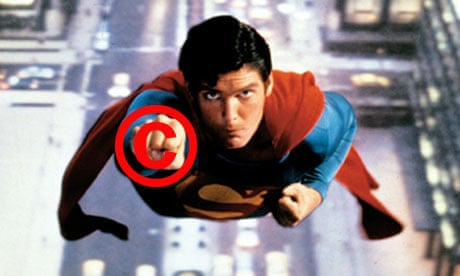There's an apocryphal tale that American role-playing games company TSR, which gave the world Dungeons & Dragons, once tried to trademark the term "Nazi". It's an urban myth, of course, relating to early versions of an Indiana Jones game the company produced which somewhat over-zealously slapped everything with a "TM" mark according to the orders of indies owners LucasFilm – even generically-labelled Nazis.
But certain terminology we think might be so ingrained in popular usage as to be generic does in fact run the risk of a lawyerly smackdown, including two phrases generating a bit of chatter at the moment – "superheroes" and "space marines".
This week, writer MCA Hogarth reported that her novel Spots the Space Marine had been removed from sale by Amazon after representations by Games Workshop, which publishes tabletop games and novels under the popular Warhammer 40,000 banner and which heavily feature "space marines".
She says on her blog: "Games Workshop told Amazon that I'd infringed on the trademark they've claimed for the term 'space marine'. In response, Amazon blocked the ebook from sale. Since then, I've been in discussion with Games Workshop, and following their responses, with several lawyers.
"To engage a lawyer to defend me from this spurious claim would cost more money than I have, certainly more than the book has ever earned me. Rather than earning money for my family, I'd be taking money from them, when previously my writing income paid for my daughter's schooling. And I'd have to use the little time I have to write novels to fight a protracted legal battle instead.
"In their last email to me, Games Workshop stated that they believe that their recent entrée into the ebook market gives them the common law trademark for the term 'space marine' in all formats. If they choose to proceed on that belief, science fiction will lose a term that's been a part of its canon since its inception. Space marines were around long before Games Workshop."
While "space marines" might not be a phrase you drop into everyday conversation, what about "superhero"? Can it be that it's actually a trademark, co-owned by the big two comics publishers in the world, Marvel (home of Spider-Man, the Avengers and the Hulk) and DC Entertainment (Batman, Superman, Wonder Woman)?
American comics creator Ray Felix is, according to an interview he did last week with crispcomics.com, "currently locked into a trademark battle with Marvel and DC over the word 'superhero'. For those of you not aware, the Big Two co-own the word superhero (super-hero, super hero, and all variations). It seems as silly as Microsoft and Apple co-owning the word 'PC'."
Felix says he applied to trademark his own comic title, A World Without Superheroes, and received a cease and desist letter from Marvel and DC's lawyers. He told crispcomics.com: "At first I laughed for a few months, then I realised they were not going to simply go away. I was cautioned, if not threatened in a polite manner to drop my registration mark application."
Felix says he went ahead and applied to register his trademark anyway, adding: "At first they seemed to be friendly, but once I brought into question their limitations of the word Super Hero and presented my right to use my published mark, their lawyer began to grunt and lose patience in our conversations and then began making sharp remarks."
Jonathan D Reichman, is the trademark attorney for both Marvel and DC, and says the companies have been working to amicably resolve the issue with Ray Felix and others. He says that Marvel and DC jointly trademarked the term "superheroes" in the 1960s.
"Marvel and DC jointly own the trademark and registered it around the world, including the United States and the UK," he says. "It's our responsibility to police the trademark and ensure the term is not used as a trademark without our authority and consent."
This is key – when someone else tries to trademark an already-trademarked term. So I'm not likely to have the massed ranks of Marvel and DC lawyers descending if I talk about superheroes in the pub?
"Absolutely not. We are not trying to remove a word from the English language," says Reichman. "We are just doing what we have done for decades – protect a trademarked term. And we always try to resolve matters amicably instead of going for a court hearing, which saves everyone a lot of time and money."
Games Workshop has not yet formally commented on the "space marines" issue, but on a section of their website titled "what you can and can't do with Games Workshop's intellectual property" they say: "The law requires us to protect our trademarks in certain ways – and if we do not – we might lose them. As you can imagine, we do not want to lose our trademarks as we would no longer be able to create the great miniatures and tabletop hobby wargames that we pride ourselves on!"
While Marvel and DC trademarked "superheroes" when the term was in its infancy – Spider-Man, the Fantastic Four and the Avengers only appeared in the 1960s – there might be a harder battle to be fought with "space marines" – as many on Twitter were gleefully pointing out, the earliest known usage was in 1932 in a short story entitled "Captain Brink of the Space Marines" by Bob Olsen, published in the pulp Amazing Stories.

Comments (…)
Sign in or create your Guardian account to join the discussion